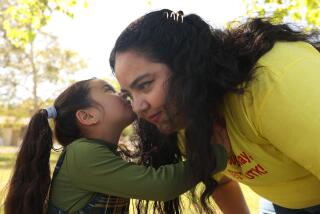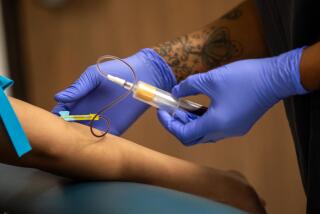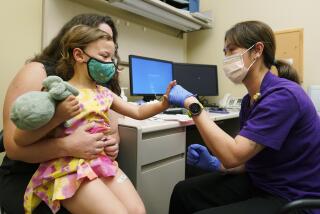UCSD Med Center to Help Test Drugs on Children With AIDS
- Share via
UC San Diego Medical Center became part of a $64-million federal effort Thursday to expand clinical trials of anti-AIDS drugs in children, marking the first systematic attempt to address the special needs of the 1,188 children in the United States known to have the fatal disease.
The five-year program will be based at 11 new pediatric AIDS drug-testing centers in major U. S. cities, including San Diego, Los Angeles and San Francisco. Spending in the first year will be $8.8 million, of which $500,000 will go to UCSD.
Together with two other units that previously had been started, the 13 centers will apply to children the lessons learned in drug trials being conducted on about 5,000 adults through a similar network of federal centers. Researchers also will seek treatments for manifestations of the disease that are unique to children with AIDS.
Broad Access to AZT
Although research, not treatment, is the main goal of the program, it will for the first time give children broad access to AZT, the only AIDS drug proven to be effective at prolonging life.
“I hope we capture as large a fraction of the total population (of children with AIDS) as possible,” said Dr. Daniel Hoth, director of the AIDS program for the National Institute of Allergy and Infectious Diseases, which announced the new program in Washington.
“It certainly is the first time that we have had funds for treatment of children with AIDS in San Diego,” said Dr. Stephen Spector, director of the new clinical trials unit for children at UCSD Medical Center. “We have been caring for children with AIDS, but I think that this will provide us with a form with which we can systematically have available to them the best possible drugs and . . . we can learn more and advance their treatment.”
In addition to the 1,188 U. S. children reported to have AIDS as of Oct. 3, there are an estimated two to three times as many who are infected with the AIDS virus but who do not show symptoms, federal officials estimate.
In San Diego, county statistics record seven children under age 13 with AIDS as of July 31. But UCSD physicians have treated 10 to 15 children in the past several years who have AIDS, Spector said, and confidential testing data indicate that an additional 55 to 60 children in the area are infected but have no symptoms yet.
Overall, San Diego County recorded in August its 1,000th case of the disease since the epidemic began.
The slow research and limited availability of drug treatments to children have concerned pediatric AIDS specialists in recent years, and they hailed the new effort as a step forward.
“A great deal of the hesitancy stemmed early on from just the need for pediatricians to convince people that there was such a thing as pediatric AIDS,” Spector said. “It was several years after AIDS was identified and accepted in adults that pediatric AIDS was accepted--even though cases were identified at almost the same time as in adults.”
The U.S. Centers for Disease Control recorded the first child with AIDS in late 1982, a year after the first adult case was identified. By January 1983, 26 childhood cases had been reported and 10 of the children had died.
“We’re immediately starting any new drug in children right away. And that’s a big change,” said Dr. Yvonne Bryson, co-principal investigator at UCLA for the Los Angeles trials, which will be coordinated in seven city hospitals by the UCLA Center for Health Science. “And we’re going faster into the pregnant women.”
A Small Trial
Bryson said the UCLA program and the University of Miami hope to begin a small trial within the next two months to see if AZT given to the mother just before birth will prevent transmission of HIV, the AIDS virus, to the baby.
Infection before or during birth has become the major route of infection for children in big cities, where women contract the virus through intravenous drug use or sexual activity with a drug user. It has been estimated that 5% of births in the Bronx, for instance, are to women who carry the AIDS virus.
Other projects being planned nationwide include testing whether the antibodies in human immunoglobulin, given intravenously, can prevent some of the serious bacterial infections that afflict children who have AIDS; whether AZT given to babies shortly after birth can prevent infection from their mothers; and searching for ways to identify HIV infection in fetuses and infants.
Spector said researchers are also looking toward beginning to use AZT in children who are infected with HIV but have no symptoms, in an attempt to ward off the precipitous weakening of the immune system that accompanies symptoms when they occur. But systematic trials are necessary, he said.
“What is absolutely critical is to make sure when we give these children treatments that we’re not doing harm,” Spector said. “We want to make sure . . . that the drug is helping and not hurting.”
One side effect of AZT treatments, for instance, is anemia.
He said UCSD will encourage parents of children infected with HIV but who are asymptomatic to seek treatment through the program.
The UCSD center will treat children from San Diego, Imperial and Orange counties, he said. Cooperating institutions are Children’s Hospital and Health Center, San Diego; Mercy Hospital and Health Center; Naval Hospital San Diego; Kaiser Medical Center; UC Irvine; and Children’s Hospital of Orange County.
Besides UCSD and UCLA, the national centers designated Thursday will be at UC San Francisco, at three hospitals in New York City, and in Baltimore, Boston, Miami, Houston and Chicago. The two previously established pediatric AIDS testing centers are in Boston and Newark, N.J.
More to Read
Sign up for Essential California
The most important California stories and recommendations in your inbox every morning.
You may occasionally receive promotional content from the Los Angeles Times.













